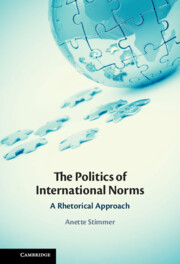Book contents
- The Politics of International Norms
- The Politics of International Norms
- Copyright page
- Dedication
- Contents
- Figures
- Tables
- Acknowledgments
- Abbreviations
- Introduction
- 1 Alternate Endings of Norm Contestation
- 2 Persistence of Alternate Endings
- 3 Norm Impasse
- 4 Norm Neglect
- 5 Norm Recognition
- 6 Norm Clarification
- Conclusion
- Bibliography
- Index
3 - Norm Impasse
Contested Statehoods of Kosovo, and of South Ossetia and Abkhazia (Territorial Integrity vs. Self-Determination)
Published online by Cambridge University Press: 07 February 2025
- The Politics of International Norms
- The Politics of International Norms
- Copyright page
- Dedication
- Contents
- Figures
- Tables
- Acknowledgments
- Abbreviations
- Introduction
- 1 Alternate Endings of Norm Contestation
- 2 Persistence of Alternate Endings
- 3 Norm Impasse
- 4 Norm Neglect
- 5 Norm Recognition
- 6 Norm Clarification
- Conclusion
- Bibliography
- Index
Summary
This chapter analyzes the norm impasses over the status of Kosovo after its declaration of independence in February 2008 and over the status of South Ossetia and Abkhazia following the 2008 August war. Both cases happened within quick succession, revolved around the same well-established norms in the United Nations (UN) Charter – the rights to territorial integrity vs. self-determination – and showed an interesting reversal of sides: While the United States (US) and European states recognized Kosovo’s statehood and rejected Russia’s emphasis on Serbian territorial integrity, the US and European states rejected Russia’s support of South Ossetia’s statehood and emphasized Georgian territorial integrity. These norm impasses became protracted because each side received social support from key audiences, or at least only muted criticism, for their interpretations, lowering the cost of disagreement. These disputes show both the power and limits of international law: The US’s sui generis frame and Russia’s quasi-legal argumentation indicate that there is a strong collective expectation regarding using international law to justify claims. Yet these cases also indicate that protracted norm impasses weaken individual norms: Unclear norm meaning gives leeway for interpretation, which can be used to craft interpretations that appeal to important audiences and thereby reduce pressure to abandon contested norm interpretations.
Keywords
- Type
- Chapter
- Information
- The Politics of International Norms , pp. 118 - 155Publisher: Cambridge University PressPrint publication year: 2025

